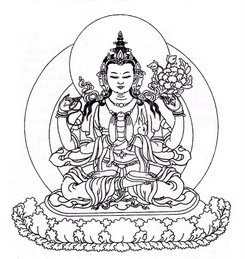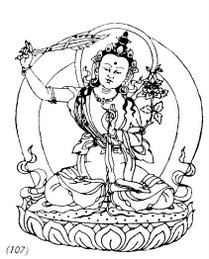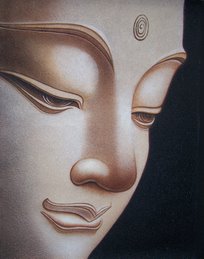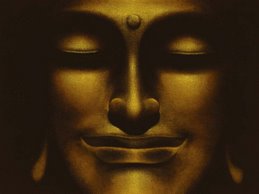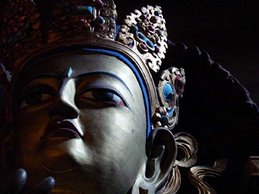On day, when the rainy season had ended, Krsa Gautami, the wife of a rich man, was plunged deep into grief by the loss of her only son, a baby boy who had died just when he was old enough to run about.
In her grief Krsa carried the dead child to all her neighbors in Kapilavastu, asking them for medicine. Seeing her, the people shook their heads sadly out of pity.
"Poor woman! She has lost her senses from grief. The boy is beyond the help of medicine." Unable to accept the fact of her son's death, Krsa then wandered through the streets of the city beseeching for help everyone she met. "Please, sir," she said to a certain man, "give me medicine that will cure my boy!" The stranger looked at the child's eyes and saw that the boy was dead. "Alas, I have no medicine for your child," he said, "but I know of a physician who can give what you require. "Pray tell me, sir, where I can find this physician."
"Go, dear woman, to Sakyamuni, the Buddha, just now residing in Banyan Park." Krsa went in haste to the Nigrodharama; and she was brought by the monks to Buddha."Reverend Lord," she cried, "give me the medicine that will cure my boy!" Lord Buddha, Ocean of Infinite Compassion, looked upon the grief-stricken mother with pity."You have done well to come here for medicine, Krsa Gautami. Go into the city and get a handful of mustard seed." And then the Perfect One added: "The mustard seed must be taken from a house where no one has lost a child, husband, parent, or friend."
"Yes, Lord!" exclaimed Krsa, greatly cheered. "I shall procure the mustard seed at once! "Poor Krsa then went from house to house with her request; and the people pitied her, saying: "Here is the mustard seed: please take all you want of it.
"Then Krsa would ask: "Did a son or daughter, father or mother, die in your family?"Alas! The living are few, but the dead are many. Do not remind us of our deepest grief!"And there was no house but that some relative, some dear one, had died in it.
Weary and with hope gone, Krsa sat down by the wayside, sorrowfully watching the lights of the city as they flickered up and were extinguished again, And at last the deep shadows of night plunged the world into darkness. Considering the fate of human beings, that their lives flicker up and are extinguished again, the bereft mother suddenly realized that Buddha, in his compassion, had sent her forth to learn the truth.
"How selfish am I in my grief!" she thought. "Death is universal: yet even in this valley of death there is a Path that leads to Deathlessness [for] him who has surrendered all thought of self!" Putting away the selfishness of her affection for her child, Krsa Gautami went to the edge of a forest and tenderly laid the dead body in a drift of wildflowers.
"Little son," she said, taking the child by the hand, "I thought that death had happened to you alone; but it is not to you alone, it is common to all people."There she left him; and when dawn brightened the eastern sky, she returned to the Perfect One.
"Krsa Gautami," said the Tathagata, "did you get a handful of mustard seed from a house in which no one has ever lost kith or kin?"That, Lord, is now past and gone," she said. "Grant me support."
"Dear girl, the life of mortals in this world is troubled and brief and inseparable from suffering," declared Buddha, "for there is not any means, nor will there ever be, by which those that have been born can avoid dying. All living beings are of such a nature that they must die whether they reach old age or not. "As early-ripening fruits are in danger of falling, so mortals when born are always in danger of dying. Just as the earthen vessels made by the potter end in shards, so is the life of mortals. Both young and old, both those who are foolish and those who are wise - all fall into the power of death, all are subject to death.
Of those who depart from this life, overcome by death, a father cannot save his son, nor relatives their kinsfolk. While relatives are looking on and lamenting, one by one the mortals are carried off like oxen to the slaughter. People die, and their fate after death will be according to their deeds. Such are the terms of the world. "Not from weeping nor from grieving will anyone obtain peace of mind. On the contrary, his pain will be all the greater, and he will ruin his health. He will make himself sick and pale; but dead bodies cannot be restored by his lamentation.
"Now that you have heard the Tathagata, Krsa, reject grief, do not allow it to enter your mind. Seeing one dead, know for sure: 'I shall never see him again in this existence.' And just as the fire of a burning house is quenched, so does the contemplative wise person scatter grief's power, expertly, swiftly, even as the wind scatters cotton seed.
"He who seeks peace should pull out the arrow lamentations, useless longings, and the self-made pangs of grief. He who has removed this unwholesome arrow and has calmed himself will obtain peace of mind. Verily, he who has conquered grief will always be free from grief - sane and immune - confident, happy, and close to Nirvana, I say."
Then Krsa Gautami won the stage of Entering-the-Stream, and shortly afterwards she became an Arhat [found Nirvana for herself]. She was the first woman to have attained Nirvana under the dispensation of Sakyamuni Buddha.
